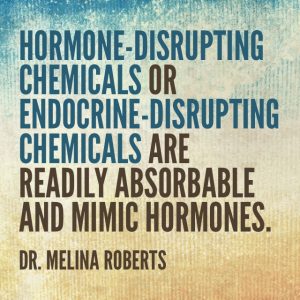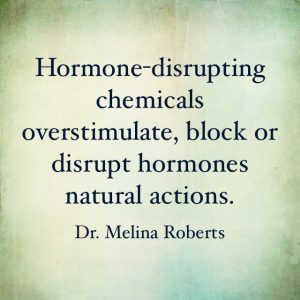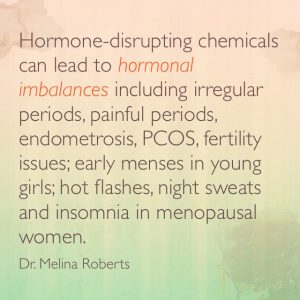Hormone-disrupting chemicals or endocrine-disrupting chemicals are readily absorbable and mimic hormones. They overstimulate, block or disrupt hormones natural actions.
Clinically this can show up as irregular periods, painful periods, endometrosis, PCOS, fertility issues; early menses in young girls; hot flashes, night sweats and insomnia in menopausal women
- Parabens: Synthetic preservative in personal care products and fragrances.
- Disrupts hormones
- Phthalates: Synthetic preservative, solubilize and stabilize fragrances (nail polish, perfumes), plasticizers (increase flexibility, transparency and durability) (ie. Plastic wrap), foods packaged or stored in plastic containers
- Interact with endocrine receptor sites located on every cell
- Bisphenol A (BPA): Lining of canned foods, plastic bottles, plastics in food and beverage containers, plastic wrap, baby bottles
- disrupts hormones, disrupts immune system, stimulates autoantibody production, causes weight gain, insulin resistance, diabetes
- Organophosphates, organochlorides – herbicide and pesticides
- Disrupts hormones, disrupts immune system, disrupts the microbiome, causes weight gain, insulin resistance, diabetes
- Herbicide glyphosate: Blocks testosterone and estrogen receptor sites
- Heavy metals
- Harmful effects on the endocrine system, immunity and brain function.
- Associated with infertility, Hashimoto’s disease, neurological disorders.
- Affinity for the pituitary, which is the relay station for messages to the adrenals, thyroid, ovaries and disrupts communication to these glands.
- Thyroid-disrupting heavy metals are mercury, lead and cadmium.



